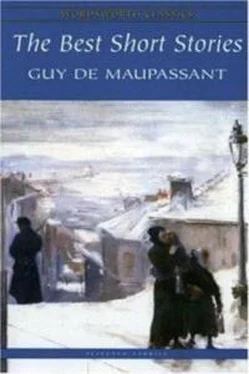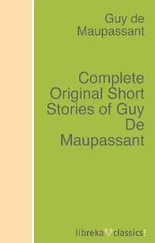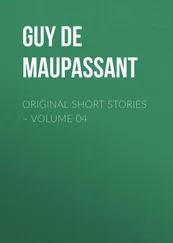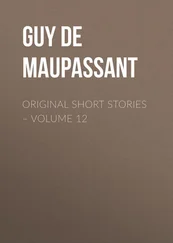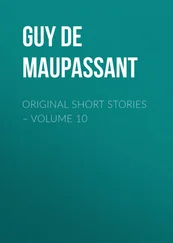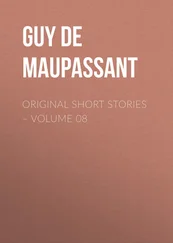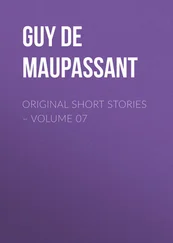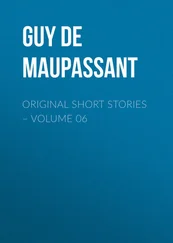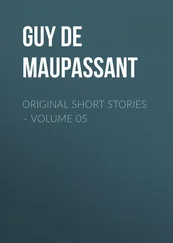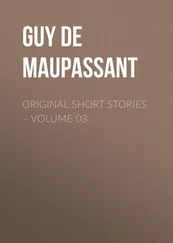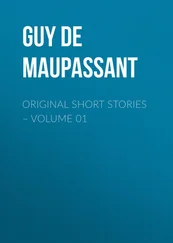The shore, with its brown rocks, was bathed by the motionless Mediterranean. The hot summer sun stretched like a fiery cloth over the mountains, over the long expanses of sand, and over the motionless, apparently solid blue sea. The train went on through the tunnels, along the slopes, above the water, on straight, wall–like viaducts, and a soft, vague, saltish smell, a smell of drying seaweed, mingled at times with the strong, heavy perfume of the flowers.
But Paul neither saw, looked at, nor smelled anything, for our fellow traveller engrossed all his attention.
When we reached Cannes, as he wished to speak to me he signed to me to get out, and as soon as I did so, he took me by the arm.
"Do you know, she is really charming. Just look at her eyes; and I never saw anything like her hair."
"Don't excite yourself," I replied, "or else address her, if you have any intentions that way. She does not look unapproachable; I fancy, although she appear to be a little bit grumpy."
"Why don't you speak to her?" he said.
"I don't know what to say, for I am always terribly stupid at first; I can never make advances to a woman in the street. I follow them, go round and round them, and quite close to them, but never know what to say at first. I only once tried to enter into conversation with a woman in that way. As I clearly saw that she was waiting for me to make overtures, and as I felt bound to say something, I stammered out, 'I hope you are quite well, madame?' She laughed in my face, and I made my escape."
I promised Paul to do all I could to bring about a conversation, and when we had taken our places again, I politely asked our neighbor:
"Have you any objection to the smell of tobacco, madame?"
She merely replied, "Non capisco."
So she was an Italian! I felt an absurd inclination to laugh. As Paul did not understand a word of that language, I was obliged to act as his interpreter, so I said in Italian:
"I asked you, madame, whether you had any objection to tobacco smoke?"
With an angry look she replied, "Che mi fa!"
She had neither turned her head nor looked at me, and I really did not know whether to take this "What do I care" for an authorization, a refusal, a real sign of indifference, or for a mere "Let me alone."
"Madame," I replied, "if you mind the smell of tobacco in the least—"
She again said, "Mica," in a tone which seemed to mean, "I wish to goodness you would leave me alone!" It was, however, a kind of permission, so I said to Paul:
"You may smoke."
He looked at me in that curious sort of way that people have when they try to understand others who are talking in a strange language before them, and asked me:
"What did you say to her?"
"I asked whether we might smoke, and she said we might do whatever we liked."
Whereupon I lighted my cigar.
"Did she say anything more?"
"If you had counted her words you would have noticed that she used exactly six, two of which gave me to understand that she knew no French, so four remained, and much can be said in four words."
Paul seemed quite unhappy, disappointed, and at sea, so to speak.
But suddenly the Italian asked me, in that tone of discontent which seemed habitual to her, "Do you know at what time we shall get to Genoa?"
"At eleven o'clock," I replied. Then after a moment I went on:
"My friend and I are also going to Genoa, and if we can be of any service to you, we shall be very happy, as you are quite alone." But she interrupted with such a "Mica!" that I did not venture on another word.
"What did she say?" Paul asked.
"She said she thought you were charming."
But he was in no humor for joking, and begged me dryly not to make fun of him; so I translated her question and my polite offer, which had been so rudely rejected.
Then he really became as restless as a caged squirrel.
"If we only knew," he said, "what hotel she was going to, we would go to the same. Try to find out so as to have another opportunity to make her talk."
It was not particularly easy, and I did not know what pretext to invent, desirous as I was to make the acquaintance of this unapproachable person.
We passed Nice, Monaco, Mentone, and the train stopped at the frontier for the examination of luggage.
Although I hate those ill–bred people who breakfast and dine in railway–carriages, I went and bought a quantity of good things to make one last attack on her by their means. I felt sure that this girl must, ordinarily, be by no means inaccessible. Something had put her out and made her irritable, but very little would suffice, a mere word or some agreeable offer, to decide her and vanquish her.
We started again, and we three were still alone. I spread my eatables on the seat. I cut up the fowl, put the slices of ham neatly on a piece of paper, and then carefully laid out our dessert, strawberries, plums, cherries and cakes, close to the girl.
When she saw that we were about to eat she took a piece of chocolate and two little crisp cakes out of her pocket and began to munch them.
"Ask her to have some of ours," Paul said in a whisper.
"That is exactly what I wish to do, but it is rather a difficult matter."
As she, however, glanced from time to time at our provisions, I felt sure that she would still be hungry when she had finished what she had with her; so, as soon as her frugal meal was over, I said to her:
"It would be very kind of you if you would take some of this fruit."
Again she said "Mica!" but less crossly than before.
"Well, then," I said, "may I offer you a little wine? I see you have not drunk anything. It is Italian wine, and as we are now in your own country, we should be very pleased to see such a pretty Italian mouth accept the offer of its French neighbors."
She shook her head slightly, evidently wishing to refuse, but very desirous of accepting, and her mica this time was almost polite. I took the flask, which was covered with straw in the Italian fashion, and filling the glass, I offered it to her.
"Please drink it," I said, "to bid us welcome to your country."
She took the glass with her usual look, and emptied it at a draught, like a woman consumed with thirst, and then gave it back to me without even saying "Thank you."
I then offered her the cherries. "Please take some," I said; "we shall be so glad if you will."
Out of her corner she looked at all the fruit spread out beside her, and said so rapidly that I could scarcely follow her: "A me non piacciono ne le ciriegie ne le susine; amo soltano le fragole."
"What does she say?" Paul asked.
"That she does riot care for cherries or plums, but only for strawberries."
I put a newspaper full of wild strawberries on her lap, and she ate them quickly, tossing them into her mouth from some distance in a coquettish and charming manner.
When she had finished the little red heap, which soon disappeared under the rapid action of her hands, I asked her:
"What may I offer you now?"
"I will take a little chicken," she replied.
She certainly devoured half of it, tearing it to pieces with the rapid movements of her jaws like some carnivorous animal. Then she made up her mind to have some cherries, which she "did not like," and then some plums, then some little cakes. Then she said, "I have had enough," and sat back in her corner.
I was much amused, and tried to make her eat more, insisting, in fact, till she suddenly flew into a rage, and flung such a furious mica at me, that I would no longer run the risk of spoiling her digestion.
I turned to my friend. "My poor Paul," I said, "I am afraid we have had our trouble for nothing."
The night came on, one of those hot summer nights which extend their warm shade over the burning and exhausted earth. Here and there, in the distance, by the sea, on capes and promontories, bright stars, which I was, at times, almost inclined to confound with lighthouses, began to shine on the dark horizon:
Читать дальше
